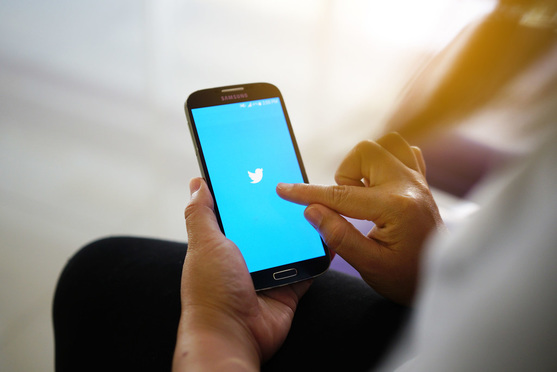For Law Profs, Beware the Perils of Twitter
Legal scholars should ditch the snark and stick to their areas of legal expertise when using Twitter, according to a new law review article.
January 11, 2018 at 04:54 PM
7 minute read
Twitter was awash with law professors proffering legal opinions a year ago when activists sued President Donald Trump for alleged violations of the emoluments clause.
Not all those weighing in were constitutional law experts with a firm grasp on the somewhat obscure statute barring officials in the federal government from receiving gifts from foreign governments, however.
That's a problem, according to Carissa Byrne Hessick, a professor at the University of North Carolina School of Law and author of a new essay urging her colleagues to exercise caution on Twitter in order to protect their professional reputations and preserve the standing of the legal academy.
With more law professors using Twitter to weigh in on the issues of the day—and sometimes veering into the platform's culture of snark and incivility—it's time for law professors to have a conversation about how best to use the medium, Hessick argues in her draft article, “Towards a Series of Academic Norms for #LawProf Twitter,” which will appear in an upcoming edition of the Marquette Law Review.
Hessick's essay has prompted a vigorous discussion among legal academics over the past two weeks surrounding the myriad benefits and pitfalls of Twitter. Tenure provides a great deal of cover for professors to tweet what they wish without jeopardizing their jobs, but their tweets can still impact how students and colleagues view them.
Twitter allows law professors to more easily engage with lawyers and others outside academia and quickly disseminate their ideas rather than publishing a law review article after months—if not years—of work, Hessick said. But the immediacy of a platform known for its “hot takes” and its tendency to amplify the most forceful tweets can be at odds with the professoriate's mission of producing reasoned legal analysis and fostering civil debate.
“Twitter rewards people for responding quickly to issues, which is sort of the opposite of what professors do,” Hessick said in an interview. “Usually we don't offer opinions on things until we've spent a really long time thinking about them, digging into them, and trying to consider the other side. Twitter also rewards a lack of nuance.”
Hessick suggests that law professors on Twitter should follow two general norms: Assume people believe you are an expert when tweeting about legal issues and make clear when you are out of your wheelhouse; and use Twitter to “promote informed discussion and reasoned debate,” while keeping a civil tone with those with whom you disagree. In short, curb the sarcasm and antagonism.
That's generally wise advice, said Josh Blackman, a law professor at South Texas College of Law—Houston who is a prolific Twitter user with nearly 13,000 followers.
“When professors run afoul on Twitter, a lot of times it's when they are getting into political matters,” Blackman said. “I won't tweet something that I wouldn't put in a law review article. I don't footnote my tweets, but I give them the same level of care. I don't see a difference.”
Blackman said he is careful when tweeting to use qualifying statements such as “it has been reported that,” or “it appears.” He also tries to eliminate politics from his tweets, in part because he knows his students read them.
“If a professor flies off the handle and voices every single political position on the left or right, students take note of that,” Blackman said.
Trump's presidency has opened a floodgate of law professors tweeting about nearly every development out of the White House, even when they lack expertise in the topic of the day, Blackman noted.
“I think that diminishes the worth of the professoriate,” he said. “They're using [Twitter] in a way I wouldn't.”
Buzzfeed took Harvard Law School Professor Laurence Tribe to task in a May article questioning why he was retweeting anti-Trump articles from somewhat dubious sources. (Tribe told Buzzfeed he was simply passing on information that was interesting if true, and that a retweet did not imply he had personally fact-checked a linked article.) Tribe is a major star in the law professor Twittersphere, with 274,000 followers.
Glenn Reynolds, a prominent conservative and professor at the University of Tennessee College of Law with more than 88,000 Twitter followers, was briefly suspended from the platform in September 2016 after tweeting a photo of people on a Charlotte Interstate protesting a police shooting with the comment “Run them down.” The law school conducted an investigation but opted not to punish Reynolds.
“If we identify ourselves as law professors on the platform, then we should really think about what it means to be a law professor and how our behavior on that platform reflects on the profession as a whole,” Hessick said.
It's unclear how may law professors are on Twitter. A 2015 survey identified 553, but that number likely has grown over the past three years. Law professors primarily used the platform to promote their scholarship and discuss conferences when she joined in 2015, Hessick said. But today's tweeting law professors seem far more engaged with practitioners and the news issues of the day, she said.
The current Twitter debate echoes the discussion law professors had 15 years ago about the value of blogging, said Richard Hasen, a professor at the University of California, Irvine School of Law who has nearly 30,000 followers.
“It seems to me to be a perennial question as to whether law professors, as law professors, should be using new media to communicate to new sets of people,” he said. “It's not quite a new debate, its just shifted from one platform to another.”
In fact, more than half of the traffic to Hasen's Election Law Blog comes from Twitter, he said.
According to Hasen, Twitter is an effective tool to reach a broad audience and can lead to unexpected exchanges. Just last month he and talk show host Montel Williams traded tweets regarding Alabama Secretary of State John Merrill's handling of the state's recent senate election. Williams qualified a tweet supportive of Merrill based on facts provided by Hasen. “It's not like I could otherwise get to Montel Williams,” Hasen said of Twitter's ability bring users together.
In October, U.S. Supreme Court Justice Elena Kagan outed herself as a Twitter user to Hasen after he live-tweeted a talk she gave at Chicago-Kent College of Law. When Hasen introduced himself to the Justice later that day, she asked if he had been the one tweeting her talk.
“It was pretty obvious that not only is Justice Kagan lurking on Twitter, but she was interested enough that she was checking it between the reception and the next event,” Hasen said.
And no, Kagan does not have an account under her real name. Her twitter handle is a source of speculation among the lawyers who call themselves #AppellateTwitter.
For all Twitter's benefits, Hasen said it can be difficult to discern when fellow law professors are giving their political opinions on Twitter and when they are offering up legal ones, particularly during the polarizing Trump presidency. Law professors shouldn't be precluded from sharing their political views on Twitter, he said, but they should make clear that they aren't offering a legal opinion when they do.
Hessick said she doesn't want to dissuade law professors from Twitter. Rather, she hopes to spark more soul searching about how to use the platform to advance the public's understanding of the law and current events.
“I don't think we should mock people who take a different position,” she said. “We should acknowledge that reasonable people could disagree with what we're saying. That's one of the important things we teach our students in law school, so I'd hate to think we're fanning the flames of nastiness in the greater public discourse through Twitter.”
This content has been archived. It is available through our partners, LexisNexis® and Bloomberg Law.
To view this content, please continue to their sites.
Not a Lexis Subscriber?
Subscribe Now
Not a Bloomberg Law Subscriber?
Subscribe Now
NOT FOR REPRINT
© 2025 ALM Global, LLC, All Rights Reserved. Request academic re-use from www.copyright.com. All other uses, submit a request to [email protected]. For more information visit Asset & Logo Licensing.
You Might Like
View All
University of New Hampshire Law School Launches Specialized Health, Life Sciences Program

Supreme Court Takes Up Case Over Approval of Religious Charter School

The Week in Data Jan. 24: A Look at Legal Industry Trends by the Numbers

Trending Stories
- 1'Reverse Robin Hood': Capital One Swarmed With Class Actions Alleging Theft of Influencer Commissions in January
- 2Hawaii wildfire victims spared from testifying after last-minute deal over $4B settlement
- 3How We Won It: Latham Secures Back-to-Back ITC Patent Wins for California Companies
- 4Meta agrees to pay $25 million to settle lawsuit from Trump after Jan. 6 suspension
- 5Stevens & Lee Hires Ex-Middle District of Pennsylvania U.S. Attorney as White-Collar Co-Chair
Who Got The Work
J. Brugh Lower of Gibbons has entered an appearance for industrial equipment supplier Devco Corporation in a pending trademark infringement lawsuit. The suit, accusing the defendant of selling knock-off Graco products, was filed Dec. 18 in New Jersey District Court by Rivkin Radler on behalf of Graco Inc. and Graco Minnesota. The case, assigned to U.S. District Judge Zahid N. Quraishi, is 3:24-cv-11294, Graco Inc. et al v. Devco Corporation.
Who Got The Work
Rebecca Maller-Stein and Kent A. Yalowitz of Arnold & Porter Kaye Scholer have entered their appearances for Hanaco Venture Capital and its executives, Lior Prosor and David Frankel, in a pending securities lawsuit. The action, filed on Dec. 24 in New York Southern District Court by Zell, Aron & Co. on behalf of Goldeneye Advisors, accuses the defendants of negligently and fraudulently managing the plaintiff's $1 million investment. The case, assigned to U.S. District Judge Vernon S. Broderick, is 1:24-cv-09918, Goldeneye Advisors, LLC v. Hanaco Venture Capital, Ltd. et al.
Who Got The Work
Attorneys from A&O Shearman has stepped in as defense counsel for Toronto-Dominion Bank and other defendants in a pending securities class action. The suit, filed Dec. 11 in New York Southern District Court by Bleichmar Fonti & Auld, accuses the defendants of concealing the bank's 'pervasive' deficiencies in regards to its compliance with the Bank Secrecy Act and the quality of its anti-money laundering controls. The case, assigned to U.S. District Judge Arun Subramanian, is 1:24-cv-09445, Gonzalez v. The Toronto-Dominion Bank et al.
Who Got The Work
Crown Castle International, a Pennsylvania company providing shared communications infrastructure, has turned to Luke D. Wolf of Gordon Rees Scully Mansukhani to fend off a pending breach-of-contract lawsuit. The court action, filed Nov. 25 in Michigan Eastern District Court by Hooper Hathaway PC on behalf of The Town Residences LLC, accuses Crown Castle of failing to transfer approximately $30,000 in utility payments from T-Mobile in breach of a roof-top lease and assignment agreement. The case, assigned to U.S. District Judge Susan K. Declercq, is 2:24-cv-13131, The Town Residences LLC v. T-Mobile US, Inc. et al.
Who Got The Work
Wilfred P. Coronato and Daniel M. Schwartz of McCarter & English have stepped in as defense counsel to Electrolux Home Products Inc. in a pending product liability lawsuit. The court action, filed Nov. 26 in New York Eastern District Court by Poulos Lopiccolo PC and Nagel Rice LLP on behalf of David Stern, alleges that the defendant's refrigerators’ drawers and shelving repeatedly break and fall apart within months after purchase. The case, assigned to U.S. District Judge Joan M. Azrack, is 2:24-cv-08204, Stern v. Electrolux Home Products, Inc.
Featured Firms
Law Offices of Gary Martin Hays & Associates, P.C.
(470) 294-1674
Law Offices of Mark E. Salomone
(857) 444-6468
Smith & Hassler
(713) 739-1250









